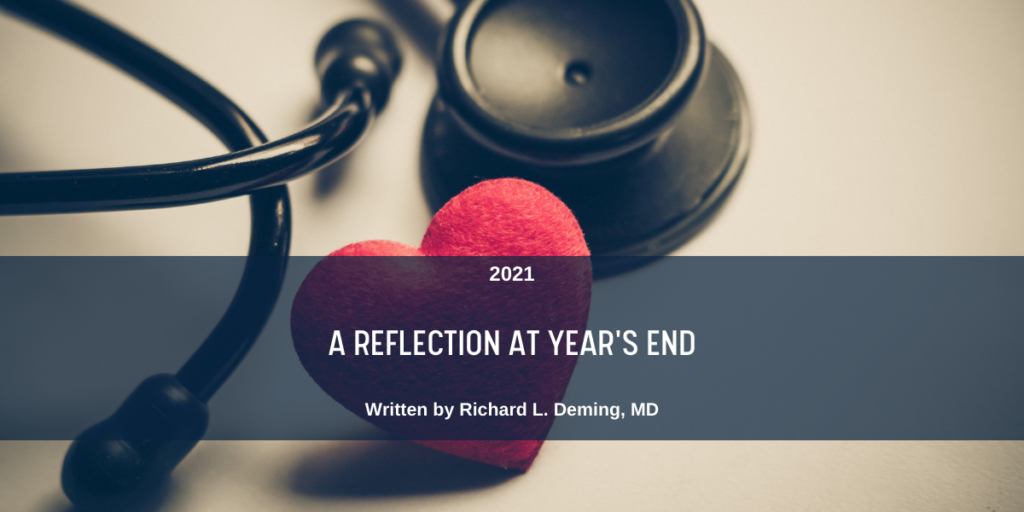A Reflection at Year’s End

by Richard L. Deming, MD
“For last year’s words belong to last year’s language and next year’s words await another voice. And to make an end is to make a beginning.” -T.S. Eliot
As we approach the end of the year, it’s appropriate for us to take time to reflect on what we have learned this year and how the knowledge that we have gained in 2021 can be used to illuminate our path forward in 2022. I think of 2021 as a year of positive adjustment. 2020 was a year of shock and confusion. In the world of cancer control, we put things on hold, held our breath and tried to deal with the urgency of pandemic care. In 2021 we realized that cancer control (prevention, screening, treatment, research, survivorship care and palliative care) were necessary and important. Delaying evidence-based cancer control efforts would undoubtable increase the burden of cancer in the future. 2021 became a year of “both/and” rather than “either/or”. In 2020, we learned how to care for patients with COVID and reduce the spread of the virus. In 2021, we continued to care for patients with COVID AND we returned to evidence-based methods of cancer control with a renewed focus on prevention, screening, and research. At our Iowa Cancer Consortium Summit this year, we shared what we had learned and re-committed ourselves to reduce the burden of cancer.
2021 brought a renewed focus on social justice, diversity, equity, inclusion and social determinants of health. The Iowa Cancer Registry’s publication, Cancer in Iowa 2021, addressed the question, “Why is it important to consider cancer differences by race/ethnicity?” We learned that Iowa’s Black population has the highest cancer incidence rates of all racial/ethnic groups for those ages 50-79 years, whereas Iowa’s White population has the highest rate among those 80 and older. We also learned that cancer is striking the Black population at a much younger age compared to the White population. This knowledge should demand us to commit to efforts to reduce cancer health disparities in Iowa in 2022.
As I reflect back on my own personal journey in 2021, I invite you to do the same. Take time for reflection. I often ask my patients, especially my patients with incurable cancer, “what has brought you the most joy since we last met?” I ask myself that very same question. We all know people who think that they want to live forever but who don’t have a clue what they could do TODAY to bring joy to themselves or to bring joy to others. Taking time to reflect on life’s big questions is essential to understanding our place in the world.
Pioneering physician Dr. William Osler wrote, “A good physician treats the disease; a great physician treats the patient who has the disease.” The same is true for anyone involved in health care. Being a caregiver in oncology involves caring for whole patient – including the physical, emotional, psychological, philosophical and spiritual dimensions. A professional caregiver providing care to a patient is a human being caring for another human being. This is the essence of humanity.
I want to share with you a story that I read in 2021 on a website that I often turn to for inspiration, The Charter for Compassion.
Years ago, anthropologist Margaret Mead was asked by a student what she considered to be the first sign of civilization in a culture. The student expected Mead to talk about fishhooks or clay pots or grinding stones.
But no, Mead said that the first sign of civilization in ancient culture was a femur that had been broken and then healed. Mead explained that in the animal kingdom if you break your leg, you die. You cannot run from danger, get to the river for a drink or hunt for food. You are meat for prowling beasts. No animal survives a broken leg long enough for the bone to heal.
A broken femur that has healed is evidence that someone has taken time to stay with the one who fell, has bound up the wound, has carried the person to safety and has tended the person through recovery. Helping someone else through difficulty is where civilization starts, Mead said. We are at our best when we serve others. Helping others through difficult times is a hallmark of our humanity.
I have also taken solace in poetry this year. I’d like to conclude with a favorite poem from former poet laureate, W.S. Merwin. It’s called Here Together.
These days I can see us clinging to each other
as we are swept along by the current
I am clinging to you to keep you from
being swept away and you are clinging to me
to keep me from being swept away from you
we see the shores blurring past as we hold
each other in the rushing current
the daylight rushes unheard far above us
how long will we be swept along in the daylight
how long will we cling together in the night
and where will it carry us together
-W.S. Merwin, “Here Together”

Dr. Richard Deming is the Vice-President of the Iowa Cancer Consortium Board of Directors, the Medical Director of Mercy Cancer Center in Des Moines, Iowa, and a founder of Above + Beyond Cancer.
